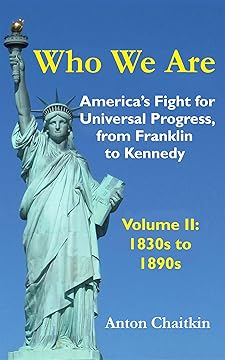Who We Are: America’s Fight for Universal Progress, From Franklyn to Kennedy Volume II 1830s-1890s
By Anton Chaitkin (2025)
Book Review
(Part 1)
In Volume II, Chaitkin carefully traces the crucial role of American advocates for the Franklin/Hamilton “American System” (see Hidden History: How Ben Franklin and Friends Created Britain’s Industrial Revolution) in making the US the world’s foremost industrial power.
For me the most interesting parts of Volume II concern Lincoln’s career as an ardent supporter of the American System of political economy and the legacy of Benjamin Franklin’s Philadelphia Philosophical Society in 1) trying to industrialize the South during Reconstruction; 2) fostering Thomas Edison’s role in bringing cheap electrical energy to America’s poor; and 3) using American System economic concepts and inventions to spur industrialization (and thwart British imperial ambitions) in Germany, Russia and Japan.
Lincoln joined the pro-industrialist movement started by Benjamin Franklin (see Hidden History: How Ben Franklin and Friends Created Britain’s Industrial Revolution) in the 1830s. The former was an ardent supporter of pro-industrialist Henry Clay, who represented Kentucky in both the House and Senate and ran (unsuccessfully) as president against incumbent Andrew Jackson in 1832.
Significant milestones in Lincoln’s career include
- 1834 – elected to Illinois legislature for eight years, where he champions legislation (the construction of the Illinois and Michigan canal and a rail link-up to Philadelphia and Columbia Railroad). After Presidents Jackson’s and Van Buren’s anti-tariff policies triggered the Panic of 1837, Illinois was forced to sell the railroad to private interests. Completed in the 1850s, the canal would ultimately make Chicago the center of the world’s greatest industrial complex.
- 1840 – successfully campaigns for Whig (pro-industrialist) President William Henry Harrison, who dies mysteriously after a month in office.
- 1846 – elected to House of Representatives as a Whig candidate. I
- 1847-49 – Lincoln’s first motion after taking his seat is to declare President James Polk’s (1845-1849) war against Mexico unconstitutional, on the basis Polk deliberately lied to the public about the reasons for the war.*
- 1854 – participates in formation of Republican Party, dedicated to preventing the spread of slavery to the West.
- 1858 – narrowly defeated by incumbent Senator Stephen Douglas as a Republican candidate for Senate.
- 1860 – elected 16th president of US.
- 1861-65** – A strong supporter of the “American system” of protective tariffs, Czar Alexander II frees 23 million Russian serfs one day prior to Lincoln’s inauguration. As seven Southern states had already seceded, Republicans gain control of the Senate and speedily passes Lincoln’s protective tariff legislation. The later enabled Philadelphia’s industrialists to build the country’s first steel and oil** industries as well as the Pennsylvania-New York railroad loop. The latter would prove vital to transporting and supplying Union troops.
Lincoln and his economic advisor Henry Carey (son of Matthew Carey – see History of the Long US Battle to Industrialize) also pushed through legislation to:
-
- address Southern soil depletion (the main driver behind the push to expand slavery westward) by creating a U Department of Agriculture and enacting the Morill Land Grant College Act (donating federal land for colleges)
- pass the Pacific Railway Act to build a transcontinental railroad
- industrialize the South
- issue $450 million dollars of government currency known as Greenbacks after Wall Street collaborates with British banks to stymie funding of the Union war effort
*The Southern slave owners instrumental in Polk’s election had a desperate need to expand slavery westward as bad farming practices had badly depleted Southern soil. Mexico declared war on the US after they illegally annexed the Mexican territory of Texas. Many officers serving in the war against Mexico subsequently joined private armies organized by Southern plantation owners to conquer Latin American and Caribbean countries in an effort to expand slavery there. Ten years later these private mercenaries would assume leadership of the Confederate army. Because the Union had no military leaders to train recruits, it lost most battles in the early years of the Civil War. Another disadvantage was that Britain was primarily responsible for funding and arming the Confederate Army (while the British Navy served as the Confederate Navy – sinking US merchant marine ships).
**Chaitkin includes a fascinating appendix documenting how Teddy Roosevelt’s Anglophile uncle financed the Lincoln assassination via British intelligence in Montreal.
***The Pennsylvania Railroad organized and developed the US petroleum industry in the 1850s, with many Civil War veterans joining in oil prospecting at the end of the war. In part by deliberately shrinking the money supply to trigger a global depression (1873-79), J P Morgan and John D Rockefeller, with the support of of British financiers, essentially bankrupted the Philadelphia railroads, enabling Morgan to gain total control of most railroads and Rockefeller of oil mining and distribution.
June 30, 2015
Click this link for the original source of this article.
Author: stuartbramhall
This content is courtesy of, and owned and copyrighted by, https://stuartbramhall.wordpress.com and its author. This content is made available by use of the public RSS feed offered by the host site and is used for educational purposes only. If you are the author or represent the host site and would like this content removed now and in the future, please contact USSANews.com using the email address in the Contact page found in the website menu.








